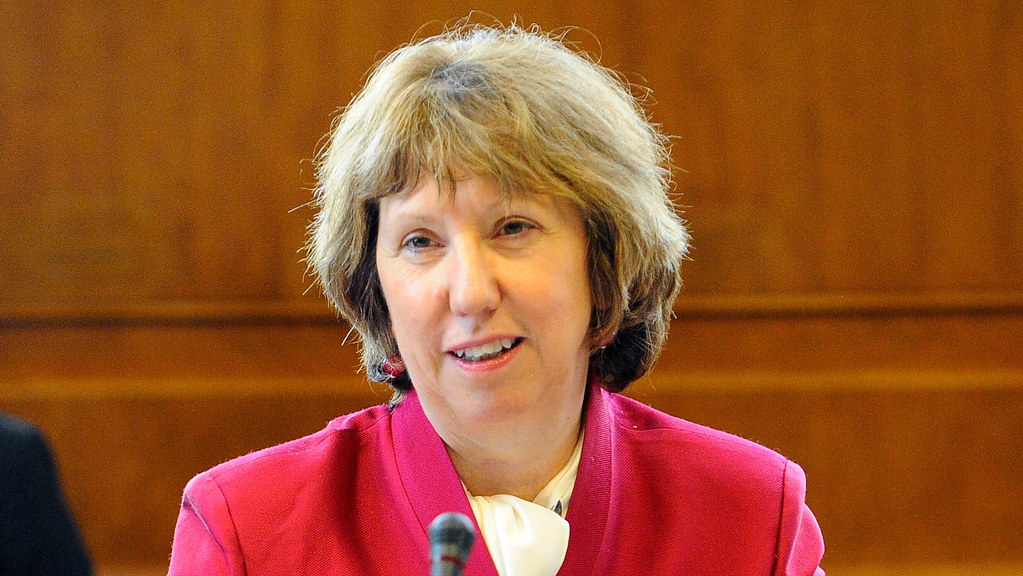Baroness Ashton is one of the most distinguished British diplomats of recent times. She has made notable and lasting contributions to global peace and security.
Baroness Ashton was born in Upholland, Lancashire, and was the first in her coal mining family to attend university, receiving a BSc in Social Sciences from Bedford College, London, in 1977. From the start of her career, she was internationalist in outlook, working as Administration Secretary, and subsequently Vice-Chair, of the Campaign for Nuclear Disarmament in the late 1970s and early 1980s.
She was Director of Business in the Community in the 1980s, during which time she worked assiduously to advance equality of opportunity in employment. She established the Windsor Fellowship to help young people from diverse ethnic backgrounds make the most of their talents. She also set up Opportunity Now, Business in the Community’s gender equality campaign, and the Employers Forum on Disability.
She was made a life peer in 1999 and her ministerial career began two years later in 2001. She was appointed Parliamentary Under-Secretary of State in the Department for Education and Skills, where she became minister responsible for the Sure Start programme for the health and educational development of under-fives, one of the most popular and successful social policies of recent decades.
Baroness Ashton was subsequently appointed Parliamentary Under-Secretary in the Department for Constitutional Affairs in 2004 and then at the Ministry of Justice in 2007. In that year, the new Prime Minister, Gordon Brown, appointed her to the Cabinet as Leader of the House of Lords and Lord President of the Council. In this role, she steered the Lisbon Treaty of the European Union through the Upper House.
In 2008, she began her European career, as European Commissioner for Trade in the Barroso Commission (the first woman to serve as trade commissioner) and the first (and now last) woman sent to the European Union as a Commissioner by the UK. During this term, she represented the EU in negotiations that ended long-running sanctions by the United States on European beef, led the EU delegation in an agreement with South Korea that removed virtually all tariffs between the two economies and represented the EU in ending a long-running dispute over banana imports from Latin America. She has experience of negotiating high-level trade deals that few others in the UK can claim.
In 2009, she was appointed the first High Representative of the European Union for Foreign Affairs and Security Policy, to serve a 5-year term. She established the European External Action Service in late 2010, which merged the external relations departments of the European Commission and the Council of the European Union. She played a vital role in normalising ties between Serbia and Kosovo, for which she was nominated for the Nobel Peace Prize by both a committee of the US House of Representatives and by members of the European Parliament. She mediated ten rounds of talks between the Prime Ministers of the two countries.
Perhaps her most important diplomatic achievement was to play a pivotal role in the first agreement reached between the Permanent Members of the UN Security Council and Germany and the government of Iran to roll back the Iranian nuclear programme in exchange for cutting economic sanctions. One newspaper wrote of her role that “it fell to Lady Ashton to play arguably the most important role in world diplomacy”. As the chosen representative of the world’s six most powerful countries, including America and China, Lady Ashton was at the centre of the Iran talks…If the resulting agreement belongs to any individual, it can be known as the “Ashton accord”.
Baroness Ashton’s achievements have not gone unnoticed. In addition to being nominated for the Nobel Peace Prize, she was made a Dame Grand Cross of the Order of St Michael and St George in the 2015 New Year Honours List for services to the European Common Foreign and Security Policy and has received the highest diplomatic honours awarded by the government of the Federal Republic of Germany and the King of Jordan. She was appointed Grand Officer, Order of the White Double Cross by Slovakia in 2014.
Chancellor, I present to you Baroness Ashton of Upholland who is eminently worthy to receive the Degree of Doctor of Laws, honoris causa.
Professor Nick Pearce
Orator

